Hybrid cars have become a pivotal choice for drivers seeking a bridge between traditional gasoline vehicles and the fully electric future. While electric vehicles are gaining traction, they often necessitate adjustments to lifestyle and charging infrastructure that aren’t feasible for everyone. The best hybrid cars offer a seamless transition, providing enhanced fuel efficiency and reduced emissions without the range anxiety or charging constraints of EVs.
However, the market for hybrid technology has largely favored larger vehicles, such as hybrid SUVs, where profit margins are more substantial. This trend, coupled with the overall shrinking of the small car segment, has led to fewer options for buyers in search of a small hybrid car. Despite this, there are still excellent choices available in 2025, offering a blend of economy, practicality, and urban-friendly dimensions.
2025’s Best Small Hybrid Cars: Quick Picks
- Most Affordable Small Hybrid: Honda Jazz
- Most Spacious Small Hybrid: Ford Puma
- Most Engaging Small Hybrid Drive: Suzuki Swift Sport
This guide highlights some of the top Small Hybrid Cars available, encompassing self-charging, plug-in, and mild hybrid systems. While outright performance isn’t the primary focus of these vehicles, they are designed to be practical, efficient, and enjoyable for everyday driving. If thrilling performance is your priority, this list may have fewer options, as these cars prioritize efficiency and usability.
The Best Small Hybrid Cars Available Now
Toyota Yaris
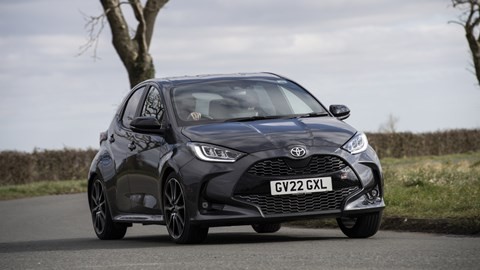 Toyota Yaris – best small hybrid cars
Toyota Yaris – best small hybrid cars
Best Small Hybrid for Fuel Economy
Pros: Exceptional fuel efficiency, renowned Toyota reliability, robust build quality.
Cons: Limited rear passenger space.
The Toyota Yaris Hybrid has shed its somewhat unexciting image with its latest iteration, emerging as a stylish and highly efficient supermini. Powered by a refined 1.5-liter three-cylinder petrol engine, this small hybrid car delivers a smoother and quieter driving experience, even at higher speeds, making motorway journeys more pleasant than its predecessor.
One of the standout features of the Yaris Hybrid is its genuinely impressive fuel economy, consistently achieving over 60mpg. This translates to incredibly low running costs, making it an ideal choice for budget-conscious drivers. The interior is solidly constructed and equipped with essential features, although the design aesthetic leans towards a more functional, albeit slightly understated, style.
Read our comprehensive Toyota Yaris review: Toyota Yaris Review
Honda Jazz
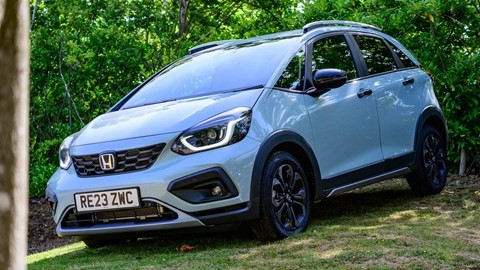 Honda Jazz – best small hybrid cars
Honda Jazz – best small hybrid cars
Best Small Hybrid for Practicality in a Compact Package
Pros: Highly efficient hybrid system, clever space-maximizing design, excellent value.
Cons: Smaller boot capacity, less engaging driving dynamics.
The Honda Jazz stands out with its intelligent hybrid system, which primarily utilizes electric motors for low-speed driving, seamlessly engaging the petrol engine for efficient cruising at higher speeds. This sophisticated system results in a remarkably smooth ride and effortless 50mpg fuel economy, perfectly complementing the Jazz’s practical nature.
The Jazz also offers exceptional value, currently holding the title of the most affordable full hybrid car on the market. Despite its compact size, this small hybrid car boasts remarkable passenger space, comfortably accommodating four adults with ample legroom. Honda’s signature flexible seating configuration further enhances practicality, although the boot space is somewhat restricted when the seats are not folded down.
Explore our full Honda Jazz review: Honda Jazz Hybrid Review
Renault Clio
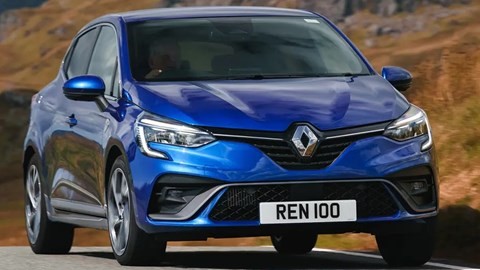 Renault Clio – best small hybrid cars
Renault Clio – best small hybrid cars
Best Small Hybrid with a Premium Interior Feel
Pros: Excellent fuel efficiency, upscale and stylish interior, strong performance for its class.
Cons: Limited rear passenger space, hybrid system can feel slightly less refined at low speeds.
Renault’s hybrid technology in the Clio draws upon the brand’s Formula 1 expertise, employing a complex arrangement of dog clutches and electric motors. This innovative powertrain delivers comparable fuel efficiency to its supermini rivals. While the hybrid system can feel a touch less polished at lower speeds, it provides robust performance for a car of this size.
The Clio distinguishes itself with a remarkably refined interior for the small hybrid car segment. Higher-spec models feature a portrait-style infotainment screen that is both visually impressive and user-friendly. The Clio also offers a generous boot capacity, although this comes at the expense of slightly restricted rear seat space. A refreshed Clio model is anticipated, promising further enhancements in styling and technology.
Discover more in our Renault Clio review: Renault Clio E-Tech Hybrid Review
Suzuki Ignis
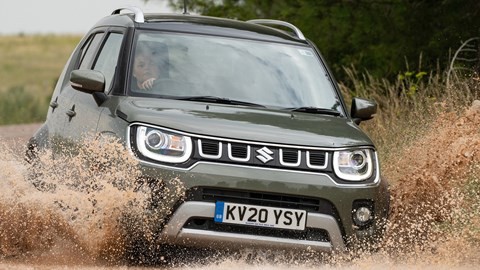 Suzuki Ignis – best small hybrid cars
Suzuki Ignis – best small hybrid cars
Best Small Hybrid for Mild Off-Road Capability
Pros: Truly compact dimensions, agile and fun handling, surprisingly spacious for its size.
Cons: More basic interior finish.
The Suzuki Ignis is a unique offering in the small hybrid car category. Its city car footprint is combined with SUV-inspired styling, and remarkably, it’s available with Suzuki’s AllGrip 4×4 system. This feature significantly enhances its capability compared to many larger crossovers, providing confident traction in varied conditions.
The Ignis’ mild hybrid 1.2-liter engine prioritizes efficiency over outright power, but it achieves impressive fuel economy figures exceeding 60mpg in relaxed driving. The tall body design also translates to unexpectedly generous interior space for such a compact vehicle.
Peugeot 308
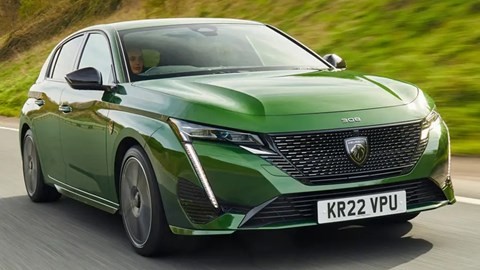 Peugeot 308 – best small hybrid cars
Peugeot 308 – best small hybrid cars
Best Small Hybrid for French Flair and Style
Pros: Striking design, luxurious interior ambiance, comfortable ride quality.
Cons: Unique driving position may not suit all drivers, plug-in hybrid powertrain not class-leading in efficiency.
The Peugeot 308 represents the more sophisticated Stellantis mid-size hatchback option, positioned above the Vauxhall Astra and Citroen C4, but below the DS 4 in terms of premium feel. The interior is a highlight, featuring high-quality materials, sleek design, and high-resolution displays, including customizable ‘iToggles’ for key functions.
The Peugeot’s driving position, characterized by a small steering wheel, might require some adjustment for certain drivers. Its plug-in hybrid system, while offering good performance, isn’t the most efficient or refined in its class. However, it delivers a smooth driving experience with ample power.
Read our detailed Peugeot 308 review: Peugeot 308 Hybrid Review
Toyota Yaris Cross
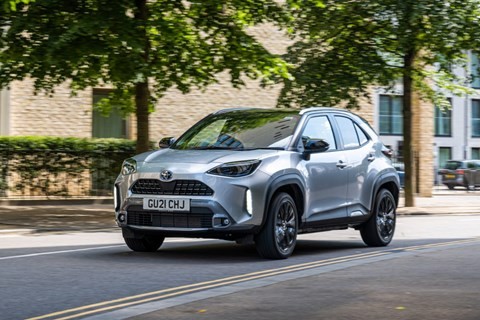 Toyota Yaris Cross – best small hybrid cars
Toyota Yaris Cross – best small hybrid cars
Best Small Hybrid SUV for Efficiency and Practicality
Pros: Excellent fuel economy, spacious boot, practical SUV bodystyle.
Cons: Understated exterior styling, functional interior design.
The Toyota Yaris Cross is essentially a Yaris hatchback elevated into a compact SUV format. It retains the highly efficient 1.5-liter hybrid powertrain of its smaller sibling and delivers comparable fuel economy, easily achieving over 50mpg with mindful driving.
The Yaris Cross excels in practicality, offering generous rear passenger space and a deep, accommodating boot. While it may not be the most exciting vehicle in terms of styling, its sensible and efficient nature makes it a compelling choice in the small hybrid car SUV segment.
Explore our full Toyota Yaris Cross review: Toyota Yaris Cross SUV Review
Suzuki Swift Sport
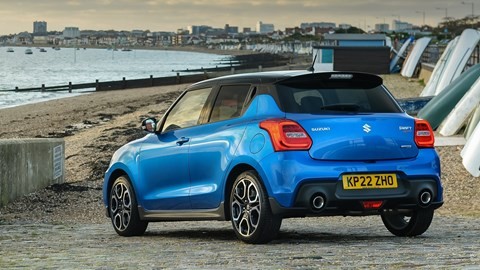 Suzuki Swift Sport – best small hybrid cars
Suzuki Swift Sport – best small hybrid cars
Best Small Hybrid for Fun and Engaging Driving
Pros: Lightweight and agile handling, enjoyable to drive, good fuel economy.
Cons: Not a true hot hatchback in terms of power, interior feels less substantial.
The Suzuki Swift Sport injects a dose of fun into the small hybrid car category. While not a high-performance hot hatchback with just 128bhp, it delivers an engaging driving experience that is rare among small hybrids.
The Swift Sport’s mild-hybrid system contributes to its lightweight nature, making it nimble and enjoyable on winding roads. It also maintains good fuel efficiency and offers decent space for its compact dimensions.
Read our Suzuki Swift Sport review: Suzuki Swift Sport 2018 Review
Kia Niro
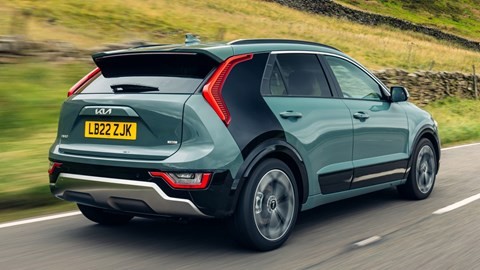 Kia Niro – best small hybrid cars
Kia Niro – best small hybrid cars
Best Small Hybrid for Powertrain Choice
Pros: Available as self-charging or plug-in hybrid, well-built and spacious interior, user-friendly infotainment.
Cons: Less engaging driving experience, arguably on the larger side of “small.”
The Kia Niro pushes the boundaries of the “small” designation, but it remains a relatively compact hybrid SUV. A key advantage of the Niro is its availability with both self-charging and plug-in hybrid powertrains, catering to different driver needs and preferences.
While not prioritizing driving thrills, the Niro boasts a well-crafted and spacious interior, complemented by one of the most intuitive infotainment systems available.
Explore our Kia Niro review: Kia Niro Hybrid Review
Ford Puma
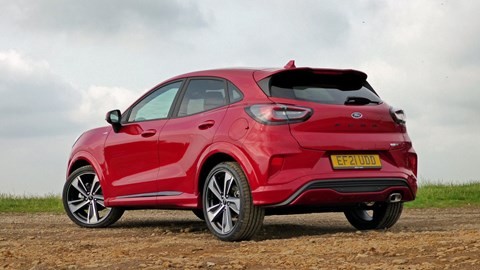 Ford Puma – best small hybrid cars
Ford Puma – best small hybrid cars
Best Small Hybrid for Boot Space and Practicality
Pros: Excellent driving dynamics, powerful and responsive mild hybrid engines, exceptionally large boot with innovative Megabox storage.
Cons: Interior dashboard materials feel less premium.
The Ford Puma excels in driving dynamics, offering engaging handling reminiscent of the Ford Fiesta. Its mild hybrid engines are both potent and efficient, and the ride quality is well-tuned.
The Puma is also surprisingly practical, providing good rear seat space and a class-leading boot capacity, enhanced by the innovative underfloor ‘MEGABOX’ storage compartment. The interior design is functional, although some dashboard materials feel less upscale.
Read our Ford Puma review: Ford Puma SUV Review
Toyota Corolla
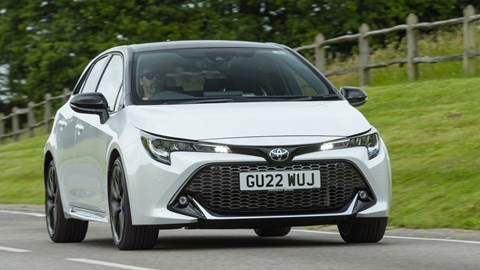 Toyota Corolla – best small hybrid cars
Toyota Corolla – best small hybrid cars
Best Small Hybrid for Long-Term Reliability and Ownership
Pros: Exceptional reliability backed by a ten-year warranty, surprisingly enjoyable driving experience, efficient and refined powertrain.
Cons: Dark interior ambiance, somewhat limited rear seat space.
Toyota’s expertise in hybrid technology is evident in the Corolla, a standout model in the small hybrid car segment. Recently updated with a more powerful hybrid system, the Corolla offers improved performance, smoothness, and excellent fuel efficiency, approaching the driving dynamics of the Honda Civic.
The updated infotainment system enhances the interior, although the rear seats remain somewhat cramped, and the overall interior aesthetic is quite dark and monochrome. However, Toyota’s renowned reliability and a ten-year warranty provide exceptional peace of mind.
Explore our Toyota Corolla review: Toyota Corolla Hatchback Review
Understanding Different Types of Hybrid Systems
The term “hybrid” encompasses a range of technologies aimed at improving fuel efficiency and reducing emissions. Originally, “hybrid” often referred to series hybrids like the early Toyota Prius, which used the engine primarily as a generator to charge the battery, enabling short electric-only driving ranges and optimized engine load.
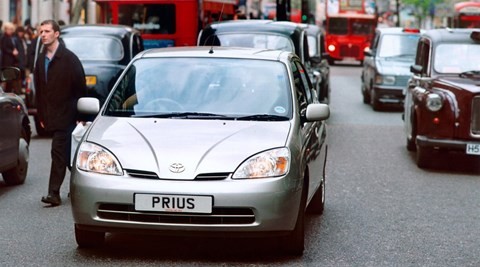 2000 Toyota Prius in London congestion
2000 Toyota Prius in London congestion
Mild hybrid cars utilize smaller, lighter batteries to assist the engine during less efficient driving phases, such as acceleration. These systems, often identified by 48V or MHEV designations, cannot power the vehicle solely on electric power.
Plug-in hybrid systems employ larger batteries, allowing for more extended electric-only driving ranges and greater emission reductions, especially on shorter trips. They also often function as series hybrids, further improving efficiency and capturing energy through regenerative braking.
However, the larger batteries in plug-in hybrids add weight and can reduce interior space. For high-mileage drivers, plug-in hybrids may not always be more economical than diesel vehicles due to the added weight and complexity.
View Leasing Offers
Are Small Hybrid Cars a Smart Choice in 2025?
For many drivers, especially those in urban environments, a small hybrid car represents an excellent choice in 2025. Plug-in hybrid models, in particular, offer significant benefits if charging at home or work is feasible. Factors such as reduced commuting distances, flexible work arrangements, a growing emphasis on air quality, and a desire to minimize visits to petrol stations all strengthen the case for hybrid vehicles.
Moreover, hybrid cars often exhibit enhanced reliability and longevity. Their combustion engines operate less frequently, especially in urban driving, and regenerative braking systems can reduce wear on brake pads and discs. While no automotive solution is without trade-offs, small hybrid cars effectively bridge the gap, offering the advantages of electric driving for city commutes and the flexibility for longer journeys without range limitations.